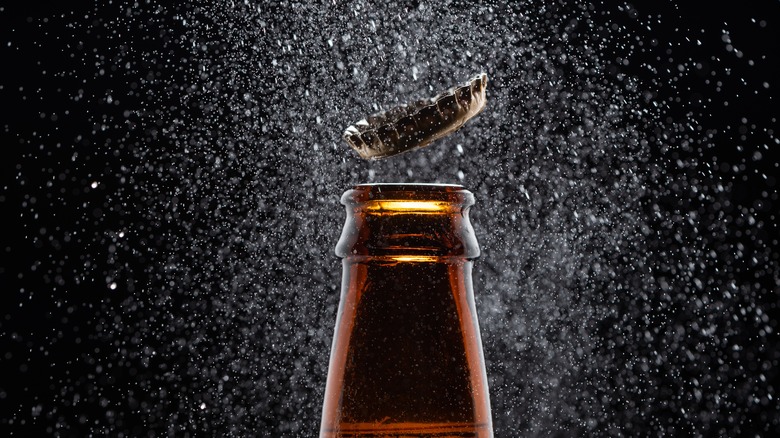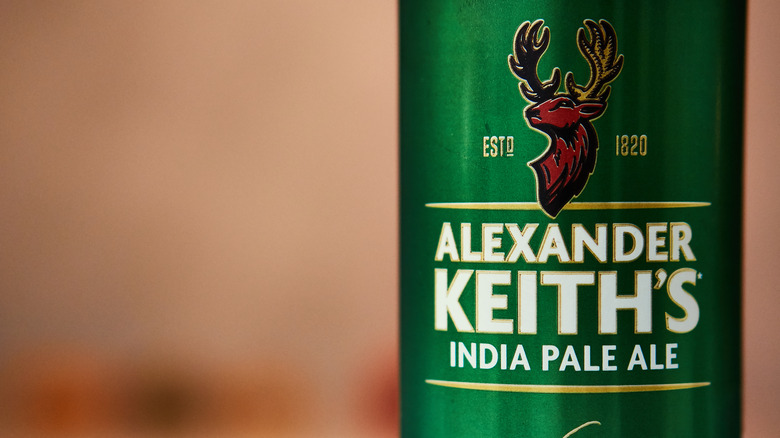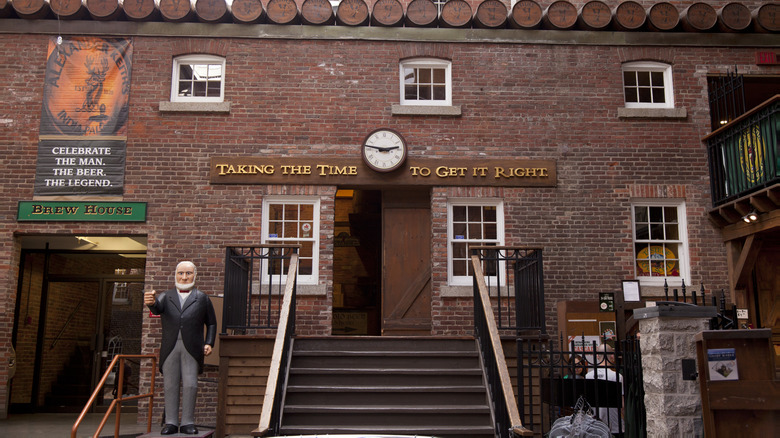The Bottle Of Beer That Almost Sparked A Legal Fight In Nova Scotia
Founded in 1820 in Nova Scotia by Alexander Keith, Atlantic Business Magazine writes that Alexander Keith's is one of the oldest breweries in North America. The publication notes that the beer continues to be produced in the same Halifax building the Scottish native purchased in 1822. SaltWire reports that Alexander Keith's beer is quintessential to Nova Scotia culture and history. Ultimately, this made amateur scuba diver Jon Crouse's November 2015 discovery even more remarkable (via the CBC). According to VICE, Crouse was diving in Halifax Harbour — more specifically, the Northwest Arm — when he came across a beer bottle on the ocean floor.
However, this was not an average beer bottle. CTV News states that the bottle, which contained liquid presumed to be beer, had a green tint, a thick lip, and a cork. The words "A. Keith & Son Brewery" were clearly labeled on the side of the cork. Crouse, a Halifax local and an antique bottle aficionado, told the CBC that he was able to discern that England produced and imported this particular beer bottle to Canada between 1872 and 1890, making the bottle over a century old. Crouse proudly noted (via the CBC), "This Keith's bottle will be the highlight of my collection." Although Crouse wanted to keep the bottle, the Canadian government had other thoughts (per a different article from the CBC).
The Canadian government believed the beer bottle was a significant item
According to the CBC, Jon Crouse was not interested in the liquid inside the 120-year-old bottle. He told reporters that he planned to preserve the cork and the bottle in a process that ensured the liquid would evaporate. Shortly after the bottle's unearthing became public knowledge, the Toronto Sun reports that Sean Weseloh McKeane from Nova Scotia's Department of Communities, Culture, and Heritage and the Nova Scotia Museum inquired about the beer bottle. Crouse told the publication that he was open to discussing with each institution and said, "The more information I can get, the better. I'm trying to paint a bigger picture."
Another article from the CBC states that the Department of Communities, Culture, and Heritage was eager to examine the bottle to see if it was what McKeane described as "a heritage object." McKeane explained, "The province of Nova Scotia can seize a heritage object. But what we like is for people to recognize that these are important things, not just for a collector, but for all of the people of Nova Scotia." McKeane also threw shade at Crouse for taking the bottle without notifying the government first.
Crouse, however, argued that he found the bottle, so he should keep it. He said (via the CBC), "I want to preserve it myself. But they probably have better knowledge than me." He went on to say, "I don't want to go to court over a bottle." Crouse noted that if he couldn't have it, he wanted the beer bottle to be accessible to the public.
Jon Crouse returned the bottle to its original home
While the beer bottle's ownership was up for debate, the CBC writes that beer enthusiasts like Halifax bar owner Chris Reynolds were determined to analyze the liquid inside. He explained, "I think it's of value to beer historians. Definitely to brewers on the science side of things — the chemistry, the hops, all that but also on the artistic side of things. It could potentially inspire brewers to brew a different way." VICE reports that Reynolds contacted Jon Crouse, who allowed him to test the bottle's contents at Dalhousie University. As Reynolds predicted, the liquid was, in fact, beer. He and a researcher at Dalhousie tasted but did not swallow the over-100-year-old ale.
Reynolds described the taste to CTV News and said, "There was a fair bit of acetic acid maybe. The next thing was salinity." He added, "There was definitely a bit of salt water maybe in there. Got some cherry notes, maybe some oak notes. A little bitterness as well." However, Crouse declined to taste his discovery and noted, "I've dove in the harbour. I've seen what it looks like."
Per CTV News, Crouse decided to give the now-famed beer bottle not to the government but to Alexander Keith's brewery in 2016. He said, "It feels like it's the right place for it to be." Alexander Keith's brewmaster, Stefan Gagliardi, told the network that they planned to "share" the bottle with all of the brewery's visitors.


